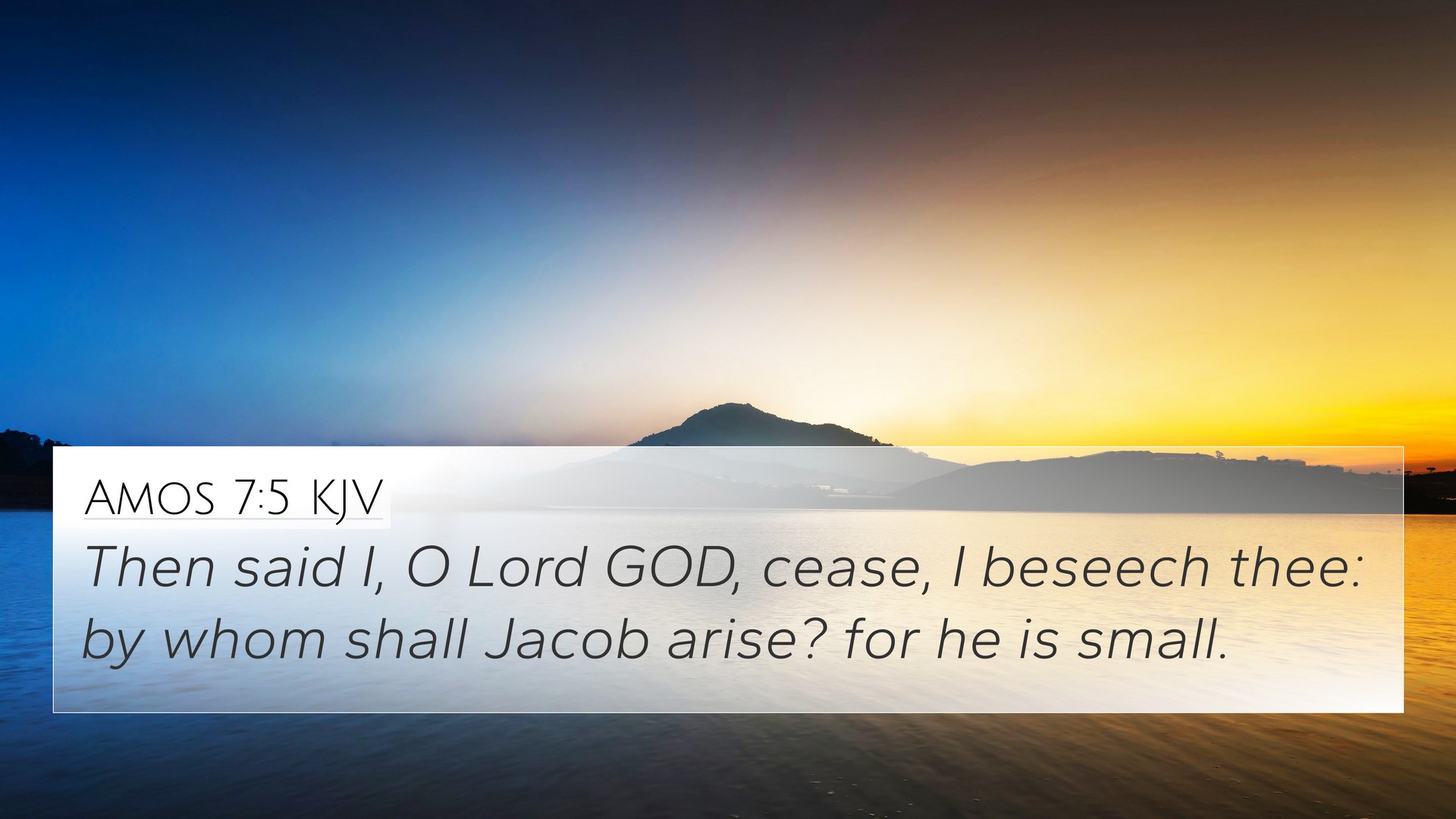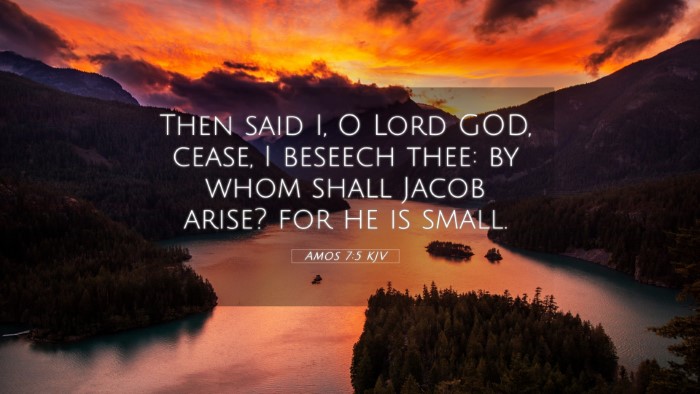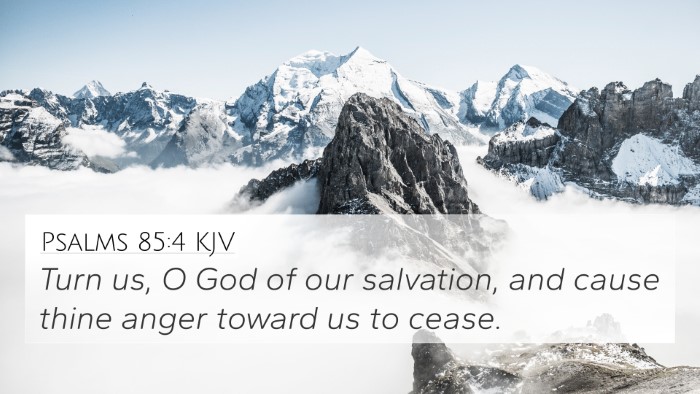Old Testament
Genesis Exodus Leviticus Numbers Deuteronomy Joshua Judges Ruth 1 Samuel 2 Samuel 1 Kings 2 Kings 1 Chronicles 2 Chronicles Ezra Nehemiah Esther Job Psalms Proverbs Ecclesiastes Song of Solomon Isaiah Jeremiah Lamentations Ezekiel Daniel Hosea Joel Amos Obadiah Jonah Micah Nahum Habakkuk Zephaniah Haggai Zechariah MalachiAmos 7:5 Similar Verses
Amos 7:5 Cross References
Then said I, O Lord GOD, cease, I beseech thee: by whom shall Jacob arise? for he is small.
Uncover the Rich Themes and Topics of This Bible Verse
Listed below are the Bible themes associated with Amos 7:5. We invite you to explore each theme to gain deeper insights into the Scriptures.
Amos 7:5 Cross Reference Verses
This section features a detailed cross-reference designed to enrich your understanding of the Scriptures. Below, you will find carefully selected verses that echo the themes and teachings related to Amos 7:5 KJV. Click on any image to explore detailed analyses of related Bible verses and uncover deeper theological insights.
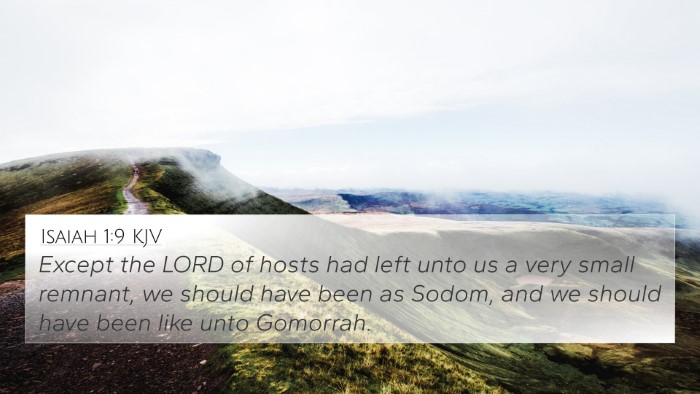
Isaiah 1:9 (KJV) »
Except the LORD of hosts had left unto us a very small remnant, we should have been as Sodom, and we should have been like unto Gomorrah.
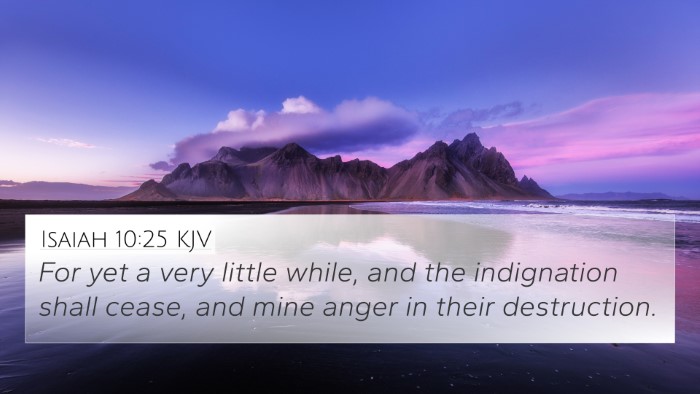
Isaiah 10:25 (KJV) »
For yet a very little while, and the indignation shall cease, and mine anger in their destruction.
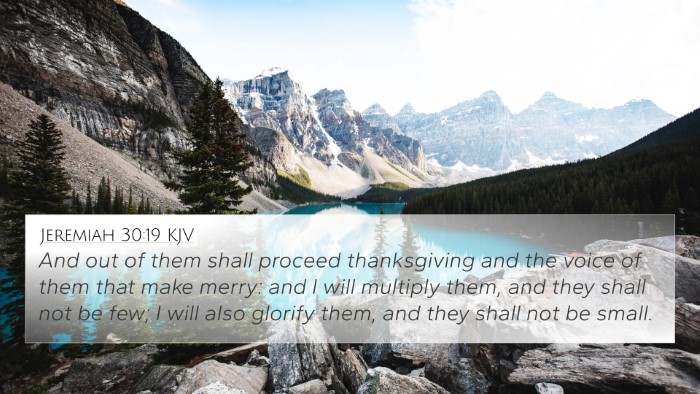
Jeremiah 30:19 (KJV) »
And out of them shall proceed thanksgiving and the voice of them that make merry: and I will multiply them, and they shall not be few; I will also glorify them, and they shall not be small.
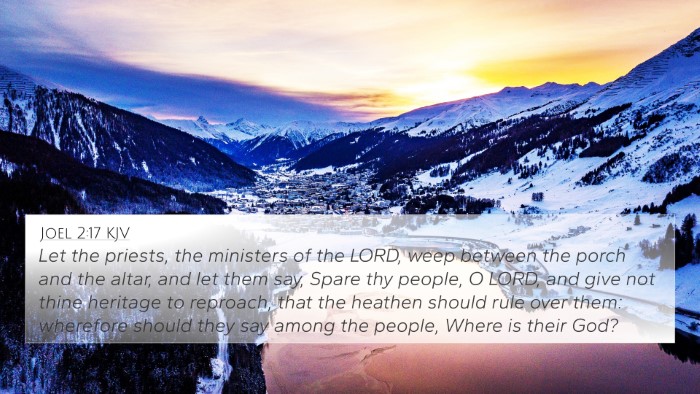
Joel 2:17 (KJV) »
Let the priests, the ministers of the LORD, weep between the porch and the altar, and let them say, Spare thy people, O LORD, and give not thine heritage to reproach, that the heathen should rule over them: wherefore should they say among the people, Where is their God?
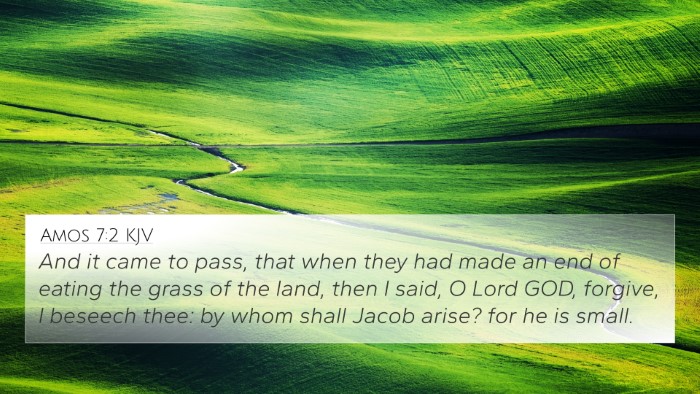
Amos 7:2 (KJV) »
And it came to pass, that when they had made an end of eating the grass of the land, then I said, O Lord GOD, forgive, I beseech thee: by whom shall Jacob arise? for he is small.
Amos 7:5 Verse Analysis and Similar Verses
Understanding Amos 7:5
Amos 7:5 states: “Then said I, O Lord God, cease, I beseech thee: by whom shall Jacob arise? for he is small.” This verse reflects a poignant moment in which the prophet Amos intercedes on behalf of Israel, demonstrating both concern and deep compassion for his people. Below is a summary of the interpretations from various public domain commentaries, expanding upon the meaning and implications of this verse.
Commentary Insights
1. Matthew Henry
Intercession for Israel: Amos shows his role as an intercessor, much like Moses did on numerous occasions. The expression “cease” indicates his urgent plea to God to halt what would be a devastating judgment upon Israel due to their iniquities. Henry emphasizes God’s justice juxtaposed with His mercy—Amos acknowledges Israel's weaknesses and pleads against total destruction.
The Smallness of Jacob: The phrase "for he is small" reflects the vulnerability of the nation. Henry suggests that Amos recognizes the insignificance of Israel in the sight of powerful nations. This evokes an understanding that the remnant might not survive without divine intervention.
2. Albert Barnes
The Lord’s Judgment: Barnes provides insights into the seriousness of God’s forthcoming judgments. He interprets Amos’s plea as a recognition of God’s sovereign power—yet, it underlines the necessity of divine compassion. Amos issues his appeal candidly, revealing both his awareness of God’s might and his passion for his own people, emphasizing intercessory prayer.
Jacob’s Identity: Barnes also points out that “Jacob” represents not only the physical descendants of Israel but also their precarious spiritual state. His commentary links the apparent fragility of Jacob to themes of grace and reliance on God’s mercy amidst impending destruction.
3. Adam Clarke
The Pathetic Appeal: Clarke emphasizes the emotional weight behind Amos's words. By appealing directly to God with “I beseech thee”, Amos recognizes the dire situation concerning Israel and expresses a heartfelt plea. Clarke underlines the importance of prayer and supplication in the face of calamity.
Understanding ‘Smallness’: Clarke further explains that "small" denotes weakness and a lack of resources. This aspect of Israel's condition highlights their dependence on God’s favor for survival, which is a recurring theme in Scripture regarding divine help for the powerless.
Bible Cross-References
Amos 7:5 connects with several significant Bible verses that provide additional insights into its themes of intercession, divine judgment, and the importance of prayer. These connections illustrate the continuity of God’s character and purpose throughout Scripture.
- Moses' Intercession: Exodus 32:11-14 - Moses pleads on behalf of Israel, showcasing the role of a mediator.
- God’s Sovereignty: Romans 9:15-16 - Emphasizes God’s mercy in choosing to show compassion.
- Spiritual Smallness: Matthew 5:3 - "Blessed are the poor in spirit," highlighting God's favor on the humble.
- Divine Protection: Isaiah 40:29-31 - God gives strength to the weary, reflective of His care for Jacob.
- General Condemnation of Israel: Hosea 11:7 - A reminder of Israel’s rebellion against divine authority.
- Intercessory Prayer: James 5:16 - The power of fervent prayer for those in need.
- Hope in Despair: Lamentations 3:22-23 - God’s mercies are new every morning, providing hope.
- Judgment and Mercy: Romans 11:22 - A balance of God's kindness and severity, relevant to Israel's fate.
- Empathy for the Weak: 1 Peter 5:7 - “Cast all your anxiety on Him,” assuring divine attentiveness to the humble.
- Repentance’s Role: 2 Chronicles 7:14 - Calls for collective humility and seeking God in difficult times.
Thematic Connections
In studying Amos 7:5 through the lens of its connections and cross-references, we uncover themes of:
- Intercession: A critical element seen throughout biblical history showcasing how prayers can alter or mediate divine actions.
- God’s Mercy: Despite human weaknesses, the theme of divine compassion remains strong; God listens to intercession.
- The Smallness and Vulnerability of Believers: The recognition of our own limitations leads to reliance on God.
Conclusion
Amos 7:5 emerges as a powerful testimony of intercessory prayer and the need for divine mercy. By exploring this verse in-depth and relating it to other scriptural texts, we gain a broader understanding of God's character as both just and merciful, embodying compassion towards those who earnestly plead for salvation. The lesson drawn from this verse encourages modern readers to embody the same spirit of intercession and dependence on God in times of crisis.
